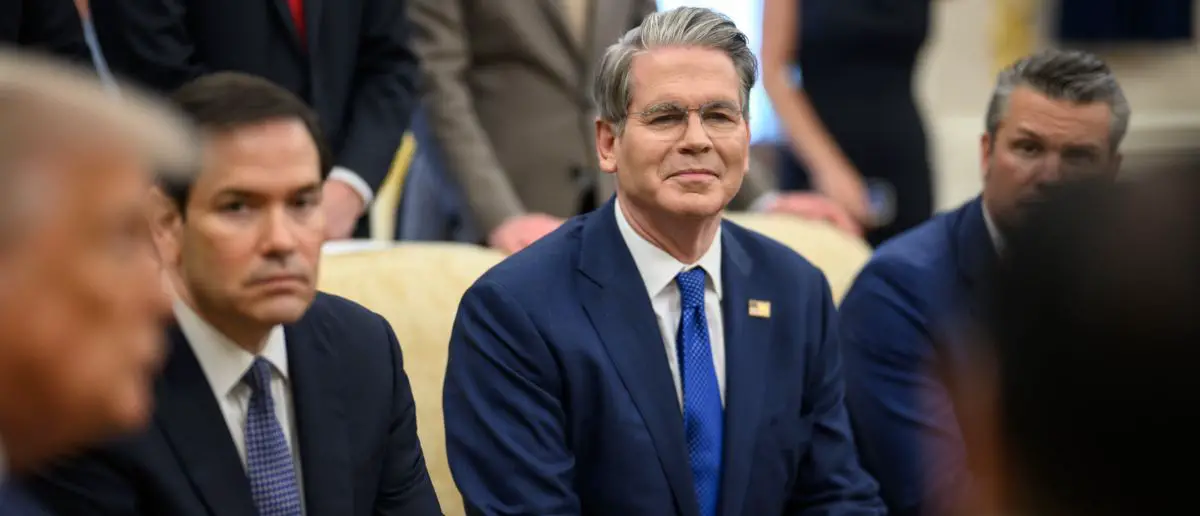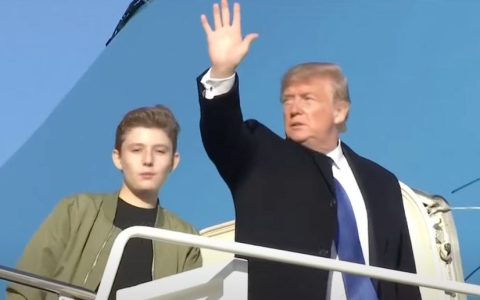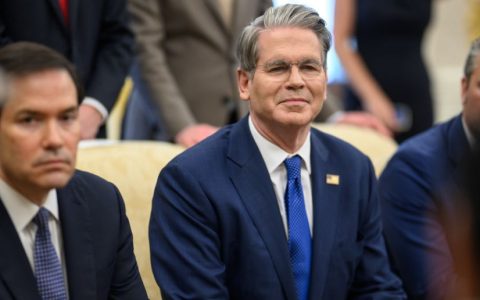
President Trump has made a risky bet. Now we know if it’s going to pay off for him.
That’s why a Fox News host went speechless over this massive President Trump news rolling in.
Trump’s UK Trade Deal A Major Win for American Business, Experts Say
President Donald Trump’s recent trade agreement with the United Kingdom, announced Thursday, marks a significant step toward strengthening American economic interests while fostering closer ties with a key ally. The deal, revealed via a Truth Social post, comes on the heels of Trump’s bold tariff policies, including a 90-day pause on reciprocal tariffs and substantial increases on Chinese imports. As Fox Business host Brian Brenberg explained on Fox and Friends to co-host Lawrence Jones, this arrangement promises to unlock billions in export opportunities for U.S. businesses, showcasing the administration’s focus on putting American companies first.
The trade deal builds on Trump’s strategic vision for global commerce, maintaining a 10% baseline tariff across the board, a policy Brenberg noted as a cornerstone of the president’s approach. “Let’s talk about what we’re going to be doing with the U.K., what we get. First of all, that 10% baseline tariff, I want you to see that that is what President Trump laid out for all countries really when he laid out the big liberation day tariffs,” Brenberg said. This consistent tariff framework signals to the world that the U.S. will negotiate from a position of strength, ensuring fair terms that prioritize domestic industries.
American businesses stand to gain significantly from the agreement, particularly in key sectors like energy and manufacturing. Brenberg pointed out that the tariff on U.S. ethanol exports to the U.K., previously as high as 19%, has now dropped to zero. “So American sellers of ethanol have more access to the U.K. market. The overall average tariff rate for all U.K. products that we sell to the U.K., down to 1.8%. The estimate is that’s about $5 billion in new export opportunities for U.S. businesses,” he said. This reduction opens doors for American producers, allowing them to compete more effectively in the U.K. market and bolster economic growth at home.
The deal also delivers benefits for the U.S. aerospace industry, with a massive $10 billion Boeing jet sale to the U.K. facilitated by favorable terms. “One of the big things they get on airline, airplane parts, okay. The U.S. is going to sell Boeing, $10 billion of Boeing jets to the U.K. In return, we’re going to take U.K. airline parts at a 0% tariff,” Brenberg explained. This reciprocal arrangement allows British manufacturers like Rolls-Royce to supply engines and parts at a zero-tariff rate, creating a win-win scenario that strengthens transatlantic trade while supporting American aviation giants.
British automakers, including luxury brands like Rolls-Royce and Jaguar, also see relief under the agreement. The 25% tariff on imported vehicles and parts, implemented by Trump in March, has been reduced to 10% for up to 100,000 U.K. cars sold annually in the U.S. “100,000 cars is about what the U.K. sells to the U.S. anyway. They will get a better rate on that,” Brenberg noted. This adjustment ensures that British automakers remain competitive in the American market, while the U.S. maintains leverage to protect its own automotive industry.
Perhaps most strategically, the deal establishes a steel and aluminum “union” between the two nations. By aligning on trade policies to prevent dumped steel products, the U.K. gains access to the U.S. market at a 0% tariff rate for these materials. “There is an alignment there on steel and aluminum in particular,” Brenberg said. This move not only counters unfair trade practices from other countries but also solidifies a partnership with the U.K. that could serve as a model for future agreements under the Trump administration.
The U.K. trade deal demonstrates the administration’s knack for crafting agreements that prioritize American workers and businesses while fostering mutually beneficial relationships with allies. By securing billions in new export opportunities and maintaining a firm stance on tariffs, Trump’s trade policies are reshaping global commerce in favor of the United States. As negotiations with other nations unfold, this deal sets a strong precedent for what American companies can expect from a leadership committed to economic prosperity.
Trump’s Crusade to Restore American Working Class
Making the rounds lately, columnist Batya Ungar-Sargon delivered a compelling case for why President Donald Trump’s 2024 victory resonates deeply with America’s working-class men. Speaking with host Rachel Campos-Duffy, Ungar-Sargon pinpointed the “crisis in masculinity” as a direct result of decades-long policies that shipped manual labor jobs overseas. This gutting of opportunity, she argued, has left millions of American men adrift, stripped of purpose and dignity. “Donald Trump is actually saying ‘no more’ to this and to the crisis in masculinity — which is of course why young men feel so attracted to what he’s offering,” Ungar-Sargon declared, framing Trump as a champion for those sidelined by globalization.
Ungar-Sargon didn’t mince words when explaining Trump’s electoral triumph. She laid the blame squarely at the feet of the Democratic Party, accusing them of abandoning young men in favor of elitist priorities. This disconnect, she argued, fueled Trump’s resurgence, as he tapped into the frustration of a demographic desperate for leadership that values their contributions. The columnist’s analysis struck a chord with Campos-Duffy, who noted that the ripple effects of this crisis extend beyond men. “When young men are not doing well, it’s not good for young women either,” Campos-Duffy told viewers, emphasizing the societal toll of neglecting the working class.
Last month, Ungar-Sargon took her praise for Trump’s agenda to Bill Maher’s Real Time, where she described the president’s platform as “socially moderate, anti-war, and anti-free-trade protectionist.” This vision, she argued, prioritizes the needs of everyday Americans over corporate interests. She went further, provocatively labeling Trump’s flurry of executive orders as aligned with a “leftist agenda” — a bold reframe that positions Trump as a populist disruptor. Her comments reveal a president intent on reshaping the economic landscape to favor those who have been left behind by decades of unchecked globalism.
When pressed on Trump’s controversial tariffs, which sent shockwaves through global markets last week, Ungar-Sargon remained steadfast. She insisted that these measures are essential to reviving the “American Dream” for workers who rely on their hands and grit. Dismissing Wall Street’s panic, she accused financial elites of attempting to undermine Trump’s vision. “But the rage that you see on Wall Street — what they are trying to do here is they are shorting the president’s agenda,” she said, casting the market’s volatility as a tantrum from a privileged class unaccustomed to being challenged.
Ungar-Sargon’s critique extended beyond economics, touching on what she called a “spiritual dissemination” of the working class under past administrations. She argued that the erosion of purpose among American men stems from both economic plunder and a cultural devaluation of their labor. At the heart of this decline, she pointed to immigration policies and the outsourcing of manual jobs. “We shipped jobs that gave men who work with their hands for a living and rely on brawn and physicality off to other countries to build up their middle class,” she stated, framing these decisions as a betrayal of American workers.
The columnist’s sharpest rebuke was reserved for Wall Street’s arrogance. “Wall Street thinks, after 60 years of being utterly catered to, that they control this country and that they should control the president and all of our elected officials,” she charged. Her words resonate with Trump’s base, who see his administration as a bulwark against the entrenched powers that have long dictated America’s economic priorities. By centering the working class, Trump’s policies signal a defiant return to an era where American labor — and the men and women behind it — are once again valued.
The economy is BOOMING under President Trump's leadership.
The American people are coming first! pic.twitter.com/pULiV5t9Wk
— Nick Adams (@NickAdamsinUSA) May 2, 2025
Stay tuned to the DC Daily Journal.





